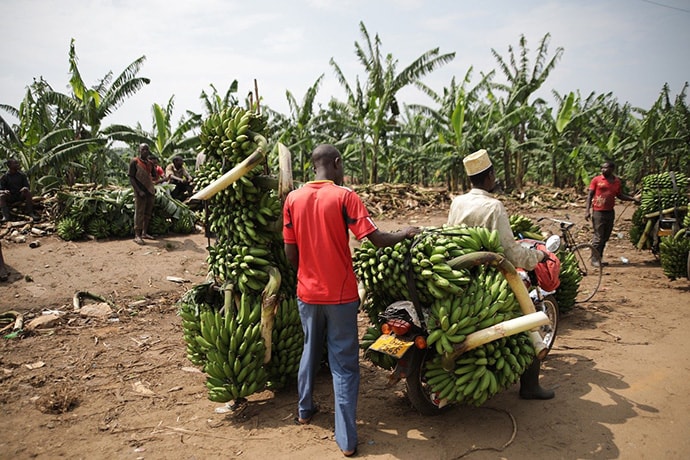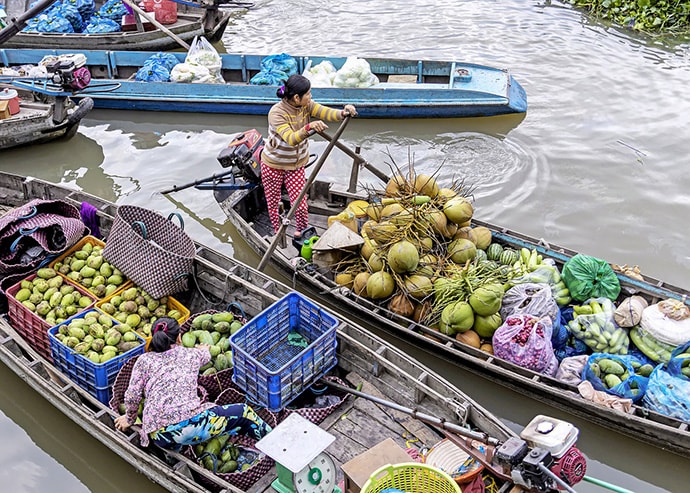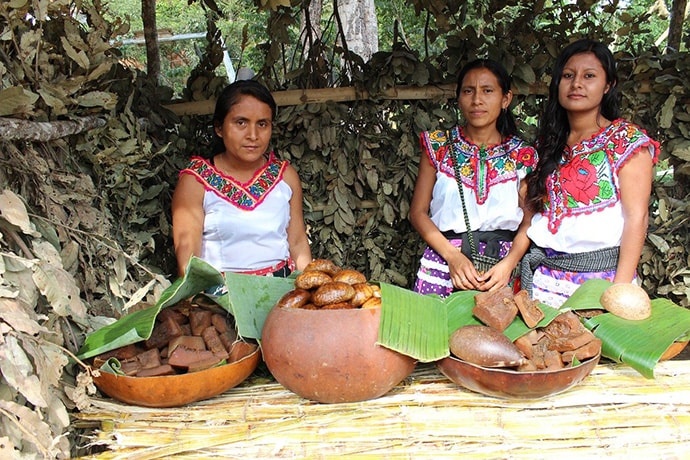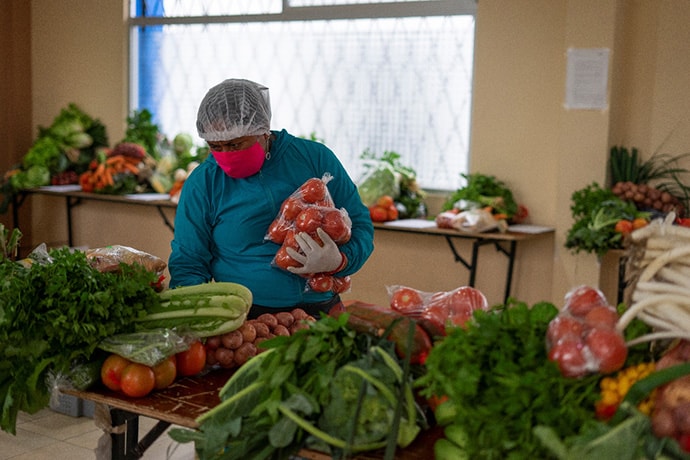Food Security and Food Systems are Fractured, Yet with Lessons From Local and Indigenous Farmers We can Perhaps Achieve 2030 Goals
By Joanne Lu

Banana farmers in Uganda.
We’re now less than 10 years away from 2030, the year by which the international community hoped to eradicate global hunger. It was always a tall order, and climate change plus the pandemic have made it even more challenging. The international community is being forced to consider how global food systems must be transformed.
Since 2014, the year before the international community adopted the Sustainable Development Goals (SDGs), the number of undernourished people in the world has actually increased, from 607 million to 650 million in 2019, according to the UN. Then, the pandemic happened, and it’s estimated that 70 million to 161 million more people experienced hunger in 2020. This equates to as many as 811 million people who are hungry and nearly 40 percent of the world population (or more than 3 billion people) who cannot afford a healthy diet.
Global awareness of the problem and urgency to solve it is increasing—although, some might argue, not fast enough. This month, the UN once again celebrated World Food Day, with a focus on promoting sustainable agri-food systems, defined as food systems in which affordable, nutritious food is available to everyone, less food is wasted, the supply chain is resilient against shocks, and production does not exacerbate climate change or harm the environment. Not only is this critical to achieving a UN goal of nourishing 10 billion people by 2050, but it is also critical to addressing profound inequalities and severe environmental degradation caused by the way we currently produce, consume, and waste food. Additionally, agri-food systems make up the largest global economic sector, employing 1 billion people around the world.
This global event follows closely on the heels of the first ever Food Systems Summit in September, held on the sidelines of the UN General Assembly. There, the UN secretary-general, UN agencies, governments, business leaders, farmers, and Indigenous people made the case for food systems reform with only “nine harvests left” until the SDGs deadline of 2030. The U.S. announced $10 billion in funding to “end hunger and invest in the food system,” half of which would be spent in the U.S., while the other half would be invested in “fighting global food insecurity.”

Food transportation and sale in Vietnam.
At the summit, the Bill and Melinda Gates Foundation made a commitment of $922 million over the next five years to address global nutrition, particularly for women and children. The commitment will support evidence-based, data-driven nutritious food systems, as well as fortifying staple foods with vitamins and minerals; maternal, infant, and young child nutrition; and innovative new approaches and interventions. It is the foundation’s largest nutrition commitment to date.
Yet, many groups criticized the summit, saying it gave corporations too much say and “promote[d] industrial monocultures over agro-ecological food.” Instead, some of the critics chose to host their own alternative summit, called the Global People’s Summit, alongside the official UN one.
“We believe that an equitable food system can only be built on the people’s right to land and livelihoods, and to decent working and living conditions for all,” the organizers of the People’s Summit said in a declaration published after the event. “This means that food production must be decided by the sovereign will of the people, based on their particular circumstances, priorities, and needs. Profit motives of corporations — euphemistically called market forces — should not determine what food to produce, how to produce it, and for whom.”
Regardless of the controversy, Indigenous people have been a key part of the discussion about sustainable food systems because their regenerative practices have sustained their communities and the earth for tens of thousands of years. Even now, Indigenous people protect 80 percent of the planet’s biodiversity. Their ability to continue doing so is critical to the entire world’s survival, including global food production. This is something that Nia Tero recognizes, which is why they work to “ensure that Indigenous peoples have the economic power and cultural independence to steward, support, and protect their livelihoods and territories they call home.” They do so through storytelling, policy advocacy, and initiatives that range from building solar-powered infrastructure to promoting Indigenous creatives.

Indigenous Oaxacan women selling food at market.
Heifer International also advocates for sustainable, context-appropriate, decentralized food systems because locally based systems are more resilient against major shocks. Heifer works with smallholder farmers around the world to implement regenerative agricultural practices that produce more food, result in less waste, and reduce their carbon footprint. For example, no-till farming techniques can help reduce greenhouse gas emissions by not releasing carbon dioxide through traditional tilling.

Local farmers supported by Heifer Ecuador built a farm-to-table food delivery system when the pandemic hit, delivering healthy food to households across the country. Credit: Isadora Romero/Heifer International
Many others have also recognized the importance of working with farmers – particularly smallholder farmers – to implement innovative techniques toward sustainable food systems. This month, Dr. Shakuntala Haraksingh Thilsted, native of Trinidad and Tobago and a Danish citizen, will be awarded the 2021 World Food Prize for her research and development of more productive and sustainable aquaculture practices for smallholder farmers. These new systems were nutrition-sensitive and transformed entire aquatic food systems. Her work, the World Food Prize Foundation says, has improved the diets of millions of the most vulnerable people in Asia and Africa.
The challenge set before us to achieve zero hunger by 2030 is ambitious, and made even more difficult by the pandemic. Yet, it appears there is growing urgency to reform our fractured global food system. Through investment, innovation, and collaboration with those who have sustained our planet for centuries, perhaps we can get several steps closer to that goal.
The following Global Washington members are helping with food systems and food security in low and middle income countries.
Earthworm Foundation is a global non-profit organization that works to make value chains an engine of prosperity for communities and ecosystems. Active in key agriculture commodity producing regions around the world, Earthworm collaborates with diverse stakeholders, including companies, communities and workers to ensure that commodity sourcing and production does not negatively impact community rights and livelihoods, environmental values, or workers. Our efforts to protect and enhance food security include initiatives focused on farmer livelihoods, healthy soils, capacity building in companies, and responsible plantation development. Our Rurality program promotes better smallholder farming practices and crop diversification with the goals of ensuring that farmer households have resilient livelihoods and access to a variety of food crops for their own consumption. At the corporate boardroom-level, we engage with company leaders to establish values-driven responsible sourcing policies, map their supply chains, and support farmers on issues such as food security for their regions.
FSC Investments & Partnerships ensures forests help bring food to the table.
As part of the global Forest Stewardship Council (FSC) family, FSC Investments & Partnerships helps to promote the responsible management of the world’s forests. Forests play an important role in complementing the production of food from other sectors to help eliminate global hunger. For example, forests and trees can be managed to provide better and more nutritionally balanced diets and greater control over food inputs. This is particularly important for marginalized groups and during periods of vulnerability such as lean seasons.
Millions of households in the developing world depend on food and fodder from forests to supplement their diets and those of their livestock. Besides the direct supply of food, forests often provide important ecosystem services, which support the water cycle and help sustain healthy agricultural sectors. Deforestation and degradation can negatively impact on this, whereas responsible forest management as set out by the requirements of FSC, plays a key role in mitigating global hunger.
You can read more about how FSC Investments & Partnerships contributes to SDG 2 here.
Fish as Food: The precarious nature of wild fish stocks has major implications for the world’s ability to achieve SDG2-Zero Hunger, focused on nutrition and global food security. Prior to the COVID-19 pandemic, an estimated 1 in 10 people faced malnutrition due to declining fish catches. The FAO’s 2021 Report on the State of Food Security and Nutrition estimates that the prevalence of undernourishment worldwide climbed to 9.9 percent in 2020, after virtually holding steady at 8.4 percent for the last 5 years. Globally, more than 3 billion people rely on fish as their primary source of protein. In many of the world’s least developed countries, where fish is often the cheapest source of protein, it accounts for more than 50 percent of protein consumption. Besides seafood being an optimal food choice for maintaining a nutritious diet, researchers have recently been investigating the antiviral properties of fish protein as part of the ongoing fight against COVID-19. For these reasons, catalyzing sustainable fisheries is as much an effort to address food security and human health as it is about environmental protection. This is why Future of Fish believes that the future of fish is not about fish, it’s about people. It’s about protecting the oceans that provide a vital source of food and livelihoods, for years to come. Future of Fish works to transform at-risk communities into thriving centers of coastal sustainability that can serve as replicable models for a just and blue economy. Knowing that one organization cannot shift the system alone, FoF partners with organizations addressing some of the ocean’s toughest challenges to protect a critical source of protein for billions of people.
Heifer International works with farmers to improve productivity, diversify their businesses and increase incomes. With a living income they can provide quality food for themselves and their families. Heifer International advocates for sustainable, context-appropriate, decentralized food systems because locally based systems are more resilient against major shocks. They work with smallholder farmers around the world to implement regenerative agricultural practices that produce more food, result in less waste and reduce their carbon footprint. For example, no-till farming techniques can help reduce greenhouse gas emissions by not releasing carbon dioxide through traditional tilling.
Landesa champions and works to secure land rights for millions of those living in poverty worldwide, primarily rural women and men, to promote social justice and provide opportunity. Many of these women and men rely on their harvests to survive, and face the increasing pressures of land degradation, droughts, and crop pests that threaten their ability to produce adequate food. With strong rights to the land on which they depend, farmers find incentive to invest in long-term sustainable conservation measures that ultimately help yield sufficient nutritious food for their families.
In Laos, with support from the Food and Agriculture Organization of the United Nations, and working with local civil society groups, Landesa is strengthening national and local application of globally endorsed approaches, instruments, and knowledge around food security and nutrition, poverty eradication, and sustainable agriculture to accelerate progress towards Sustainable Development Goal 2, Zero Hunger. This work focuses on building government and other stakeholder capacity in addition to enhancing governance and accountability mechanisms in these areas. Landesa also acts as Secretariat to Stand For Her Land, a campaign aimed at empowering women with land rights to drive lasting change. Studies show that strengthening women’s land rights results in deep benefits, including improved household nutrition. Women comprise a large share of the agricultural work force in many regions and produce a significant portion of the world’s food.
Oxfam is a global organization that fights inequality to end poverty and injustice. We offer lifesaving support in times of crisis and advocate for economic justice, gender equality, and climate action. We demand equal rights and equal treatment so that everyone can thrive, not just survive. The future is equal.
Urban Food Hives: Covid-19 exposed the fragilities and inequities of global food systems. Food insecurity, poverty, and hunger are no longer only rural phenomena, as broken supply chains and restrictions in movements affected families living in urban and peri-urban areas. Our challenge is to build a future food system that is capable of nourishing people in an era of increased risks; from climate shocks to conflict to growing inequality. Oxfam, in partnership with SecondMuse, is working with partners across six countries in Africa, Asia and Latin America – India, Nigeria, Uganda, Kenya, Colombia and the Philippines – to design, develop and implement the creation of Urban Food Hives to support regenerative, nourishing, equitable, and localized food systems. These Urban Food Hives will address inequality and advance climate and gender justice, recentering the food system to provide nutritious foods and give more voice and power to women, girls, and other marginalized communities.
To learn more about the Urban Food Hives Initiative, please contact Dr. Laté Lawson-Lartego at Late.Lawson@Oxfam.org
World Concern has a strong emphasis on improving nutrition and food security in nearly every program area. Having enough to eat moves families beyond the struggle to survive and allows them to focus on the future for their children. Providing food for today and offering sustainable ways for families to produce nutritious food long-term opens the way for transformation.
We help families feed themselves and their communities in both emergency and community development contexts. We do this through nutrition training and breastfeeding education and support for mothers, nutrition supplements for children under 5, agricultural training and improved farming methods and tools, farmer groups, livestock distributions and training, vegetable gardening, and providing fishing equipment and training. To ensure the families have food throughout the year in drought-prone areas, World Concern trains them to cultivate drought-resistant crops, and to harvest and store rainwater to irrigate their farms during the dry season.